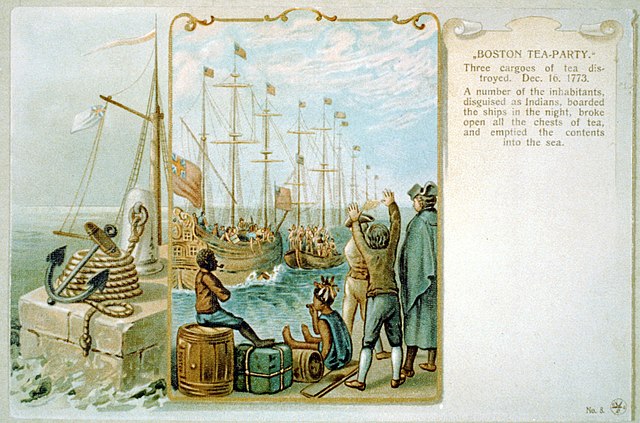
The Boston Tea Party
Looking Back At A Pivotal Piece Of American History
The Boston Tea Party, a pivotal event in American history, symbolised colonial resistance to British tyranny and taxation without representation. On December 16, 1773, enraged colonists, disguised as Mohawk Indians, dumped over 40,000 kilograms of tea into Boston Harbor to protest the Tea Act. This audacious act not only articulated opposition to economic oppression but also fostered a sense of unity among the colonies.
As we approach the 250th anniversary of the Boston Tea Party, it’s not just an event consigned to history books; it’s a pivotal moment that brewed the essence of American independence. On that chilly night of December 16, 1773, this act of defiance was more than the destruction of the favoured drink of the British; it was a catalyst that percolated through time, shaping the course of both American and world history.
Why The Need To Party?
The seeds of the Boston Tea Party were sown amid the discontent of the American colonies under British rule. The Tea Act of 1773, ostensibly designed to aid the struggling British East India Company, granted it a monopoly on tea sales in the American colonies. This act further strained the already taut relationship between the colonies and the British Crown, as it was perceived as an attempt to assert parliamentary authority and maintain taxation without colonial representation.
A Historic Night Unfolds
On that fateful night, a group of colonists, fed up with the injustice of British policies, staged a dramatic act of civil disobedience. Clad as Mohawk Indians to conceal their identities, they boarded three British ships – the Dartmouth, the Eleanor, and the Beaver – and proceeded to dump 342 chests of tea into the icy waters of Boston Harbor. The value of the tea, a staggering £10,000 in 18th-century currency (equivalent to around £1 million today), reflected the enormity of the protest.
Interestingly enough though, following the tea-dumping protest, the patriots responsible for the Boston Tea Party organised a cleanup effort. They swept the decks of the ships, removed any broken tea chests that had washed ashore, and even replaced a broken lock on one of the ship’s hatches. This attention to detail highlights the disciplined and principled nature of the protest.
Well, That Escalated Quickly
In response to the Tea Party, the British government enacted the Coercive Acts, also known as the Intolerable Acts, as a means of asserting control over the unruly colonies. As they tried to pursue reparations from those who had committed the crime, these acts only served to intensify colonial resistance, with the rallying cry of “No Taxation Without Representation” reverberating through the streets. The Boston Tea Party, rather than quelling dissent, fuelled the flames of revolution.
A Party Felt Around The World
The Boston Tea Party served as a crucial turning point in the lead-up to the American Revolution. The heightened tensions and British attempts to suppress colonial autonomy eventually led to armed conflict at Lexington and Concord in 1775. The clash of ideals and the pursuit of freedom culminated in the Declaration of Independence, which echoed the sentiments of those defiant colonists in Boston Harbour.
The reverberations of the Boston Tea Party were not confined to the shores of the Thirteen Colonies. News of the protest spread across the Atlantic, resonating with Enlightenment ideals that were sweeping through Europe. The spirit of resistance against unjust authority, as exemplified by the Boston Tea Party, inspired movements for political and social change worldwide. It contributed to the broader narrative of human rights and self-determination that would shape revolutions in France, Latin America, and beyond.
The Boston Tea Party 250 Years Later
As it reaches the 250th anniversary of the Boston Tea Party, the event imparts timeless lessons that seem relevant event today. The rebellious act of those colonists in 1773 sent ripples through time, contributing to the foundation of a nation that champions the principles of democracy, freedom, and representation. The legacy of the Boston Tea Party endures not only in history books but in the very fabric of the nation it helped to birth.
It underscores the power of collective action against injustice, reminding us that individuals, unified by a common cause, can catalyse significant change. The protest teaches the importance of dissent when faced with unjust governance and the enduring value of defending principles over personal comfort. There’s plenty of cause for that today.